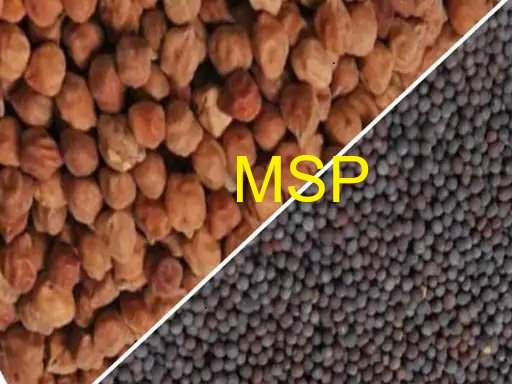Government Schemes
Direct Procurement of Chana, Mustard & Lentil at MSP Centre Approves: A Win for Farmers

Overview of the Blog
{ The Indian government has taken a significant step towards ensuring fair prices for farmers by approving the direct procurement of 2.8 million tonnes of chana (gram), 2.82 million tonnes of mustard, and 0.94 million tonnes of lentils at the Minimum Support Price (MSP) for the current rabi season. This decision aims to provide financial stability to farmers and prevent distress sales amid fluctuating market prices. }
Benefiting Key Agricultural States
The direct procurement initiative will primarily benefit farmers from Rajasthan, Madhya Pradesh, and Gujarat. These states are among the largest producers of chana, mustard, and lentils in India. The move aligns with the government’s broader vision of strengthening the agricultural sector and providing farmers with guaranteed returns on their produce.
Revamped Pradhan Mantri Annadata Aay Sanrakshan Abhiyan
The procurement falls under the revamped Pradhan Mantri Annadata Aay Sanrakshan Abhiyan (PM-AASHA). Under this scheme, the government has committed to buying 100% of tur (pigeon pea), urad (black gram), and masoor (lentils) if their prices fall below the MSP for the next four years, up to the 2028-29 financial year. This decision reassures farmers that their produce will not be sold at a loss, thereby promoting stability and sustainability in the agricultural sector.

Government’s Commitment to Farmer Welfare
Agriculture Minister Shivraj Singh Chouhan reiterated the government’s unwavering commitment to farmers’ welfare, emphasizing that no effort will be spared in ensuring their prosperity. He also urged state governments to monitor market conditions and prevent procurement at rates lower than the MSP. The Modi government’s firm stance on this matter highlights its dedication to safeguarding farmers’ interests.
Expanded Procurement for Other Crops
Apart from the rabi season procurement, the Centre has also approved MSP purchases of tur (arhar) from Andhra Pradesh, Chhattisgarh, Gujarat, Haryana, Karnataka, Madhya Pradesh, Maharashtra, Telangana, and Uttar Pradesh for the 2024-25 kharif season. Additionally, the tur procurement period in Karnataka has been extended by 30 days, making it a total of 120 days, with the deadline set for May 1, 2025.
The government has also taken proactive steps to support soybean farmers. Given the recent price drop below MSP, the Centre ensured that soybean was procured in record quantities during the kharif season, preventing financial losses for cultivators.
Nafed and NCCF: Key Players in Procurement
The National Agricultural Cooperative Marketing Federation of India (Nafed) and the National Cooperative Consumers’ Federation of India (NCCF) have been instrumental in the procurement process. These agencies have already purchased 0.24 million tonnes of tur from Andhra Pradesh, Gujarat, Karnataka, Maharashtra, and Telangana, benefiting approximately 171,569 farmers in these states.
In Uttar Pradesh, however, tur prices remain above the MSP, indicating a stronger market for the crop in that region. The government’s intervention in other states ensures that farmers receive fair compensation even when market prices decline.

Ensuring Transparency and Accessibility
To streamline procurement and ensure transparency, the government has introduced a simplified farmer registration process through Nafed and NCCF portals. This initiative facilitates hassle-free participation in procurement programs, making it easier for farmers to receive MSP benefits without bureaucratic hurdles.
Additionally, the Centre has approved copra (milling and ball) procurement in Tamil Nadu, further extending its support to farmers in various regions and sectors.
Why This Decision Matters?
- Price Stability for Farmers: Direct procurement guarantees farmers a fair price for their crops, shielding them from market volatility.
- Enhanced Government Support: With extended procurement periods and simplified registration, farmers have better access to MSP benefits.
- Boost to Rabi Crop Production: Assured procurement incentivizes farmers to cultivate more chana, mustard, and lentils, ensuring higher yields and national food security.
- Strengthening Agricultural Reforms: The government’s proactive approach reinforces its commitment to long-term agricultural reforms and farmer welfare.
- Encouraging Crop Diversification: By procuring multiple crops, the government promotes diversification and reduces dependence on a single cash crop.
Conclusion
The Centre’s approval for direct procurement of chana, mustard, and lentils at MSP is a welcome relief for farmers grappling with price fluctuations. By ensuring fair compensation, the government not only secures farmers’ livelihoods but also strengthens India’s agricultural foundation. With expanded procurement policies, increased transparency, and proactive interventions, the Modi government continues to take concrete steps towards making Indian agriculture more resilient, profitable, and future-ready.
As the rabi and kharif seasons progress, it remains crucial for the government to maintain vigilance, ensuring that procurement mechanisms function efficiently and that farmers receive their due benefits without delays. The continued focus on agricultural sustainability and farmer welfare will be instrumental in driving rural prosperity and food security in India.





















